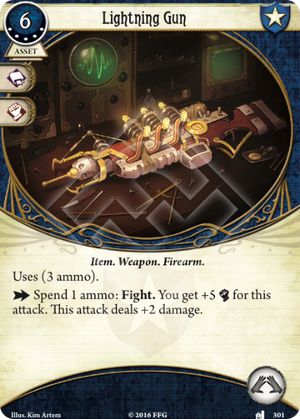
Not much beats this weapon for dominating as a combat character. The steady +2 damage and a modifier that all but guarantees successes makes this expensive killing tool unusually flexible.
Here's a comparison:
You're Roland, with your .45 Automatic you aim to kill a Ravenous Ghoul, you're 2 above the required skill check, you lay down a Vicious Blow to net you a clean kill and spend 1 on Physical Training to hit that sweet spot of +4 over the skill check, and even then on higher difficulties you might throw on another just in case you get that -5. And boom, the Ghoul is gone.
That there cost you: 4 for the gun, 2 for Physical Training, 2 and an action to play Physical Training in the first place, and a Vicious Blow as well, end cost: 3 cards, 8 resources and the extra action. You will be able to fire the gun 3 more times, but you wont kill any 3 hp enemies in one shot.
Now the lightning gun.
One shot, aaaaand DONE.
That set you back 6 resources but you're geared to do this two more times without having to pay for any boosts or playing extra cards!
Of course it wont be that simple, with a gun that big in your deck you will want to bring Prepared for the Worst to search for it and Extra Ammunition to keep it firing. You still want to draw into Vicious Blow to deal with those 4 HP enemies and the initial cost will inevitably slow you down in the earlygame.
This card does exactly what it should do and has all the drawbacks that it looks like it's got, it's a big unwieldy boomstick that will never disappoint you, but setting this up mean's you wont be doing much else.
Other cards that aren't immediately obviously good with this card:
In class:
1) Dodge and Prepared for the Worst are a big help against bosses, they essentially let you set a trap for a hunting enemy where you get a full round of emptying this gun at the foe, useful in some specific missions.
2) Stand Together, this is effectively a second set of Emergency Cache, the key benefit here is that you usually only go for Lightning Gun when you have someone else doing the clue gathering, in which case you can give them a big buff while you set yourself up. A perfect first turn would be playing this into the lightning gun and immediately playing it.
3) Beat Cop, Lightning Gun is wasted on 1 and 2 HP enemies, Beat Cop helps you mitigate these enemies.
Out of class:
1) Quick Thinking is often all but a guaranteed action. Good if you need to wade into a big fight or need to accomplish something after it.
2) Drawn to the Flame and Scrying. You don't do much when you're totally focused on fighting and there are no enemies to zap, these cards let you guide encounters onto yourself.
3) Pathfinder and Shortcut. Entering a fight quickly can be key, perhaps you need to spend an action engaging a foe or perhaps you need to fire all three shots to down a foe in one round.




